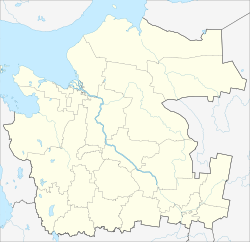Kotlas
| Kotlas (English) Котлас (Russian) |
|
|---|---|
| - Town - | |
 Former headquarters of the Pechora Railway in Kotlas |
|
 Location of Arkhangelsk Oblast in Russia |
|
|
|
|
|
|
|
|
|
|
| Administrative status (as of June 2013) | |
| Country | Russia |
| Federal subject | Arkhangelsk Oblast |
| Administratively subordinated to | town of oblast significance of Kotlas |
| Administrative center of | town of oblast significance of Kotlas,Kotlassky District |
| Municipal status (as of April 2014) | |
| Urban okrug | Kotlas Urban Okrug |
| Administrative center of | Kotlas Urban Okrug, Kotlassky Municipal District, Cheryomushskoye Rural Settlement |
| Statistics | |
| Area (urban okrug) (January 2011) | 68.039 km2 (26.270 sq mi) |
| Population (2010 Census) | 60,562 inhabitants |
| - Rank in 2010 | 271st |
| Density | 890/km2 (2,300/sq mi) |
| Time zone | MSK (UTC+03:00) |
| Town status since | June 16, 1917 |
| Postal code(s) | 165300–165306, 165308, 165309, 165311–165313, 165398, 165399 |
| Dialing code(s) | +7 81837 |
|
|
|
| on | |
Kotlas (Russian: Ко́тлас) is a town in Arkhangelsk Oblast, Russia, located at the confluence of the Northern Dvina and Vychegda Rivers. Population: 60,562 (2010 Census);60,647 (2002 Census);68,021 (1989 Census).
Kotlas is the third largest town of Arkhangelsk Oblast in terms of population (behind Arkhangelsk and Severodvinsk) and an important transport hub.
The place was probably inhabited from ancient times, but was only granted official town status by the Provisional Government of Russia on June 16, 1917, when it was a part of Vologda Governorate. In 1918, the area was transferred to the newly formed Northern Dvina Governorate, and in 1924 the uyezds were abolished in favor of the new divisions, the districts (raions). Kotlassky District was formed on June 25, 1924. In 1929, Northern Dvina Governorate was merged into Northern Krai, which in 1936 was transformed into Northern Oblast. In 1937, Northern Oblast was split into Arkhangelsk Oblast and Vologda Oblast. Kotlassky District remained in Arkhangelsk Oblast ever since.
During the 1930s, Kotlas became a place to which kulaks were deported and made to work in the forestry industry. It was managed by the Kotlaslag division of Gulag. Later, it hosted all possible categories of people repressed during the Stalin era. A significant population of Poles existed in the area, with whole Polish villages resettled here in 1920s and 1930s.
...
Wikipedia



